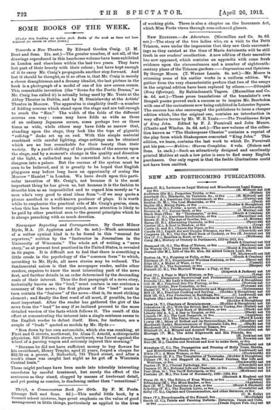SOME BOOKS OF TIIE WEEK.
[ I'll der this heading Ire r olio: such Books of the week as hare not Leen reserred for review in other forms.] Towards a New Theatre. By Edward Gordon Craig. (J. M. Dent and Sons. 215. net.)—The greater number, if not all, of the drawings reproduced in this handsome volume have been exhibited in London and elsewhere within the last two years. They have lost part of their beauty with their colour ; but have kept enough of it to carry Mr. Craig's propaganda another step forward. And lest it should be thought, as it so often is, that Mr. Craig is merely a clever draughtsman and a dreamy idealist, the last picture in the book is a photograph of a model of one of his new screen scenes. This remarkable invention (the "Scene for the Poetic Drama," as Mr. Craig has called it) is actually being used by Mr. Yeats at the Abbey Theatre in Dublin, and by M. Stanislawsky at the Artists' Theatre in Moscow. The apparatus is simplicity itself—a number of folding screens which stand upon the stage and are tall enough to reach the "flies." The width of the folds of the different screens can vary : some may have folds as wide as those of an ordinary Japanese screen, some perhaps two or three times as wide, while others may have folds so narrow that, standing upon the stage, they look like the tops of gigantic "roll-top" desks set up on end. With this simple material combined with careful lighting, stage settings can be obtained lvhich are no less remarkable for their beauty than their variety. By a yard's shifting of the positions of the screens upon the stage, and by a moment's change in the quality and direction of the light, a cathedral may be converted into a forest, or a dungeon into a palace. But the success of the system must be seen to be believed, and it is greatly to be hoped that English playgoers may before long have an opportunity of seeing the Moscow "Hamlet" in London. We have dwelt upon this parti- cular invention of Mr. Craig's, not because it is the most important thing he has given us, but because it is the fashion to describe him as an impossibilist and to regard him merely as "a man mho's very good to steal ideas from "—if we may quote a phrase ascribed to a well-known producer of plays. It is worth while to emphasize the practical side of Mr. Craig's genius, since, when this has been better recognized, more attention is likely to be paid by other practical men to the general principles which he is always preaching with so much devotion.


























































 Previous page
Previous page